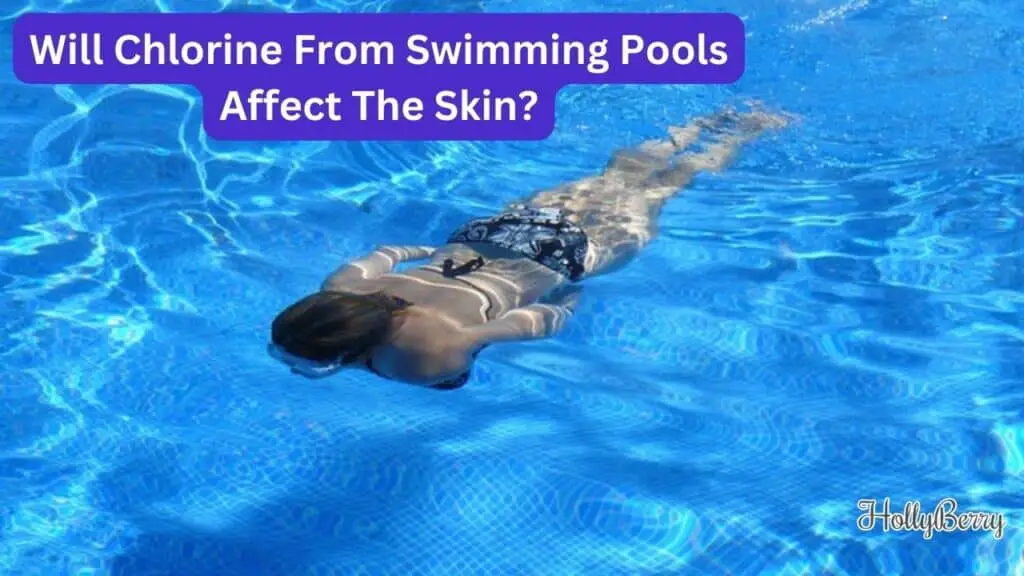
It’s pretty exciting to jump into a pool to escape the summer heat. Is it not? Chlorine is used as a sanitizer in swimming pools to kill bacteria and other microorganisms.
But did you know that swimming in chlorinated water can damage your hair and skin? Your skin is exposed to the chlorine-treated pool water while you swim which tans your skin and harms it in various ways.
So, how do you keep it safe? In this post, you will learn about the different ways chlorine can affect your skin and how to prevent and manage these symptoms.
How Does Swimming in Chlorine Water Harm Your Skin?
Prolonged contact with chlorinated water can result in a variety of damaging effects on the skin, including dryness, inflammation, redness, allergic reactions, UV damage, and perhaps even increasing pre-existing skin problems such as eczema and psoriasis.
The high pH level of chlorine can rob the skin of its natural oils and disturb the skin’s natural moisture barrier, causing irritated and dry skin.
However, there are plenty of other ways in which chlorinated water damages the skin which are as follows:
It makes the skin dry
One of the most frequently observed ways chlorine impacts the skin is by drying it out. This can result in the skin becoming stiff, irritated, and flaky, causing a loss of elasticity as well as an increase in wrinkles over time. The dryness caused by chlorine might also leave the skin more prone to severe irritations and infections.
After swimming in a chlorinated pool, it is quite important to quickly shower and moisturize. Use a mild, non-comedogenic moisturizer that will nourish your skin without clogging pores to prevent any further damage.
Redness and irritation
Another way chlorine can damage your skin is by causing redness and irritation. This can cause burning and stinging effects, mainly in delicate areas such as your mouth, nose, and eyes. This could also make your swimming sessions unpleasant and can potentially trigger much more severe skin problems such as psoriasis and eczema.
The acid layer of the skin, a protective layer that preserves the skin’s health and moisture, can also be damaged by the high pH level of chlorinated swimming pools. However, this can be easily prevented by rinsing the body and eyes under clean tap water quickly after swimming.
You should also avoid wiping your body with a towel as this may exacerbate it even more.
It causes allergic reactions
Some people might develop an allergic reaction to chlorine, which causes symptoms such as rashes, hives, and even breathing difficulties. These outbursts happen as a result of the body’s immune system reacting to chlorine and mistaking it for a dangerous substance. These allergy symptoms can be severe and must be addressed by a healthcare professional straight away.
It’s important to be informed about your own chlorine sensitivity in order to avoid this from happening and to stay away from swimming in public pools. Use a chlorine neutralizer or a chlorine-removing shampoo and conditioner both before and after swimming if you suffer from sensitive skin to reduce chlorine absorption.
Chlorine Promotes Premature Aging
Not only is chlorine harsh and irritating to the skin, but it can also lead to premature aging. The chemical has the ability to harm skin cells, resulting in the formation of wrinkles, fine lines, age spots as well as other aging symptoms. This could also make the skin seem lifeless and dry, as well as accentuate existing wrinkles.
Using mild moisturizers along with sunscreen prior to going for a swim helps shield the skin from harmful UV rays and prevent the aging process.
How to Prepare Your Skin for the Pool
- Taking a shower before going for a swim helps to wash away unwanted dirt, sweat, or oils from the body, which will help in stopping the chlorine present in the water from reacting with the body’s natural oils and sweat thus causing severe irritation.
- Applying a moisturizer on a daily basis to moisten and nourish the body prior to swimming can assist in creating a layer between your skin and the chlorine, preventing dryness.
- Wearing protective gear and equipment like swimming caps, glasses, and rash guards can help to minimize the volume of chlorine that comes into direct contact with your body and reduce irritation.
- Water-resistant and sweat-proof sunblock with a minimum SPF of 30 must be applied all over the bare skin, including the face, neck, ears, and forehead before going for a dive. Reapply sunscreen after every 2 hours or right after swimming.
Post-Swim Skin Care That Works
- Taking a shower immediately after swimming helps to wash away any chlorine deposits on the body and keeps chlorine from drying out and irritating your skin.
- Applying a body lotion to moisturize the skin after swimming would also contribute to the regeneration of the skin’s natural protective layer and radiance, as well as the prevention of dryness.
- Alternative pool disinfection methods, like saltwater or ozone systems, could help decrease the amount of chlorine needed to disinfect the water while reducing the harmful impacts on the skin.
- Contact a dermatologist if you experience serious skin reactions or if you have a history of skin problems like eczema or psoriasis. A dermatologist can offer customized consultation and treatment plans for people with sensitive skin types.
Conclusion
In order to minimize the adverse effects of chlorine on your skin, it is important to be informed of these impacts and implement the necessary safety measures. You could always simplify the process by choosing outdoor swimming pools rather than indoor ones since they provide better ventilation.
It is also important to keep in mind that drinking plenty of water before and after swimming can help keep your body hydrated and wash out any impurities absorbed through the skin.
By following the necessary measures and implementing expert guidance, you can enjoy swimming while also keeping your skin appearing and feeling its finest.


